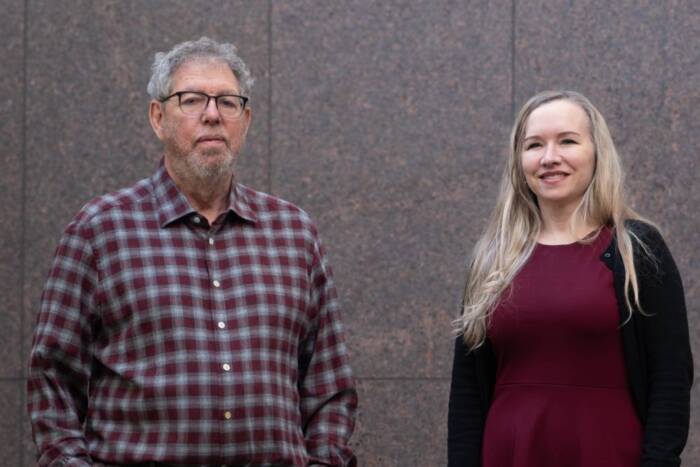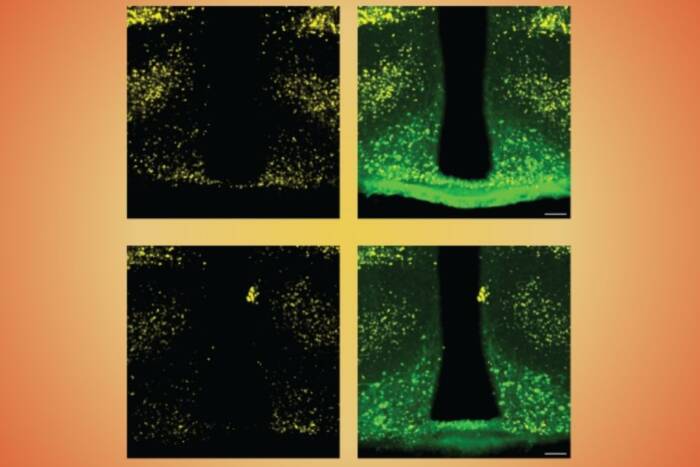Four leaders in biomedicine awarded honorary degrees
by Alexandra MacWade, assistant editor
In addition to 31 students, four esteemed scientists received degrees at this year’s Convocation ceremony. Continuing a tradition dating back more than five decades, the university awarded honorary doctorate of science degrees to distinguished individuals who have made notable contributions in their fields: James Allison, professor and department chair at The University of Texas MD Anderson Cancer Center; Max Cooper, professor at Emory University School of Medicine; Suzanne Cory, professor and former director of the Walter and Eliza Hall Institute of Medical Research; and Alice Dautry-Varsat, professor and former president of the Pasteur Institute in France.
“They are visionaries, explorers, innovators, and scientific leaders,” said Marc Tessier-Lavigne, the university’s president, who presented the degrees. “It’s a great privilege to recognize them with honorary degrees.”
James Allison
Dr. Allison was honored for his work elucidating the fundamental mechanisms of cellular immunity. Among other discoveries, Dr. Allison demonstrated how a molecule called CTLA-4 inhibits activated T cells, a type of white blood cell, impeding their ability to launch an effective immune response against tumors. This research spearheaded the development of drugs called checkpoint inhibitors, designed to help the immune system recognize and attack cancer cells.
“Jim is a pioneer and leader in cancer immunotherapy, a rapidly evolving area of medicine that has achieved unprecedented success thanks to his discoveries,” said Dr. Tessier-Lavigne. “He is an inspiration to all of us who value basic science as the most productive route to clinical breakthroughs.”
In his remarks, Dr. Allison advised the recent graduates to work on projects they love and to ask themselves, “How can I use what I know to do something to benefit mankind?” Dr. Allison received his own Ph.D. from The University of Texas at Austin. He joined MD Anderson in 2012, where he is currently professor and chair of the department of immunology.
Max Cooper
Dr. Cooper was celebrated for his insights into how white blood cells fight infections and how defects in their development can lead to leukemia, lymphoma, and autoimmune diseases. Dr. Cooper and his colleagues described two distinct types of white blood cells, B and T cells, which play important roles in the immune response. Human B cells, which originate in the bone marrow, primarily create antibodies, whereas T cells, derived from the thymus gland, are agents of cell-mediated immunity.
Dr. Cooper’s research set the stage for the development of monoclonal antibodies, which Dr. Tessier-Lavigne noted have transformed both basic research and drug discovery. “The distinction of T cells and B cells is taken for granted today,” Dr. Tessier-Lavigne said. “Through his discovery, Max changed the field of immunology forever.” Dr. Jeffrey V. Ravetch offered additional remarks about Dr. Cooper’s life and career in science.
“I’m a little bit envious of you,” Dr. Cooper, who received his M.D. from Tulane University School of Medicine, said in his address to the graduates, “not only for the high quality of your work, but also for the excitement of what you can do at this moment in time.” He is currently a Georgia Research Alliance Eminent Scholar in Developmental Immunology and professor of pathology and laboratory medicine at the Emory University School of Medicine.
Suzanne Cory
Dr. Cory received her honorary degree for offering key insights into immunology and cancer biology, as well as for her many accomplishments as an institution leader. She and her colleagues helped advance the understanding of how B cells assemble molecules on their surface, called antigen receptors, by gene recombination. In later work, they helped elucidate how abnormal chromosome rearrangements can lead to the development of cancer. They also broadened the understanding of cancer through studies of the molecular mechanisms that promote tumor formation by interfering with cell death processes.
Dr. Cory is the first woman to have served as director of the prestigious Walter and Eliza Hall Institute in Melbourne, where she is currently a professor. In 2009, she won Rockefeller’s Pearl Meister Greengard Prize, given to honor women who have made extraordinary contributions to biomedical science.
“Suzanne has been a tireless advocate for research and education in Australia and on the global stage,” said Dr. Tessier-Lavigne. “She has made vital contributions as an investigator, institutional leader, and international advocate of science for the benefit of humankind.”
“I feel very humbled at receiving this honorary degree because I’ve long regarded Rockefeller as one of the greatest biomedical research institutions in the world, and this is a day that I will treasure all my life,” said Dr. Cory, a Ph.D. alumna of the University of Cambridge.
Alice Dautry-Varsat
Dr. Dautry-Varsat was recognized for her work advancing the understanding of the host response to infectious agents, in addition to her transformative leadership of the Pasteur Institute, where she is currently head of the institute’s Biology of Cell Interactions Laboratory. Her studies have focused on receptor-mediated endocytosis and cell signaling in the immune system. Her work on intracellular pathogens has helped explain key aspects of host–pathogen interactions.
In 2005, Dr. Dautry-Varsat became the Pasteur Institute’s first woman president, a position she held until 2013. During her presidency, she promoted the expansion of numerous scientific programs, led the construction of a new research facility in Paris dedicated to emerging diseases, and strengthened the institute’s international research network.
“Alice is an accomplished cell biologist and visionary leader, who has worked in the laboratory, the field, and the boardroom to foster excellence in science for the improvement of human health worldwide,” said Dr. Tessier-Lavigne. “She has helped to nurture new generations of scientists.”
“Science starts with curiosity and requires a lot of hard work and tenacity,” Dr. Dautry-Varsat, who received her Ph.D. from the University of Paris, told the graduates. “But what really makes great science is creativity and inspiration.”


